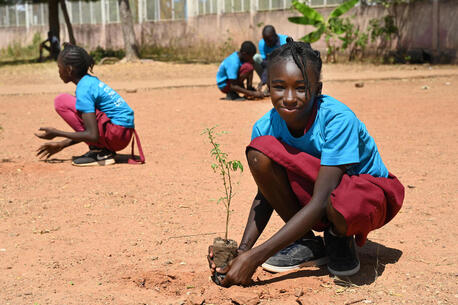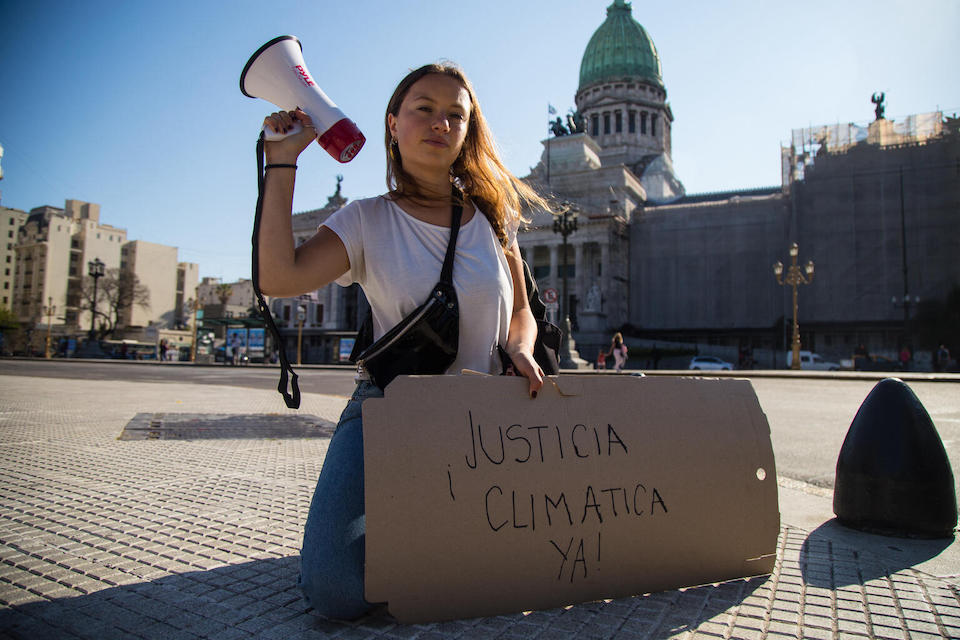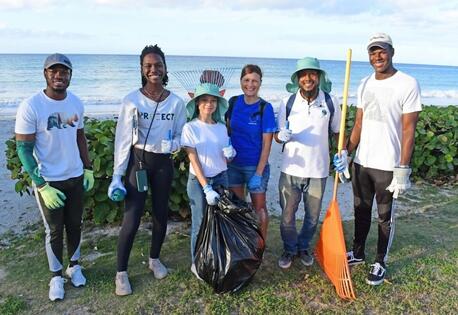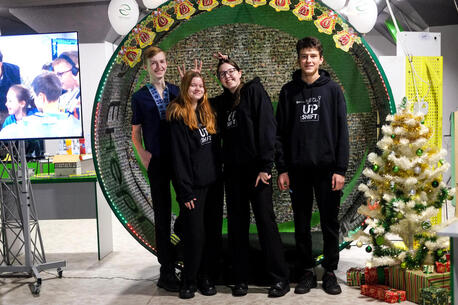
UNICEF at COP28: Advocating for Child-Focused Climate Action
Children are still bearing the brunt of climate impacts. As COP28 kicks off, and with the launch of a new Sustainability and Climate Action Plan, UNICEF urges world leaders and the international community to stop failing children and make them the focus while accelerating efforts to shape a climate-safe world.
Time to put children front and center of climate action
UNICEF's Sustainability and Climate Change Action Plan for 2023-2030 provides a detailed roadmap for protecting children from climate change, environmental degradation and natural disaster threats. Unveiled ahead of COP28 (this year's Conference of the Parties to the UN Framework Convention on Climate Change happening Nov. 30–Dec. 12 in Dubai), the new plan reinforces UNICEF's message to the world:
Stop failing children, and put them front and center of all efforts to shape a climate-safe world.
The goals and recommendations put forth in the plan reflect certain realities: that the triple planetary crisis of climate change, environmental pollution and biodiversity loss has put virtually every child in the world at risk; that nearly half of the world’s children (1 billion) face extreme risks to their ability to survive, grow and thrive; and that the failure to confront the greatest threat of this generation has created a child rights crisis – jeopardizing every child’s fundamental right to health care, healthy food, safe drinking water and sanitation, uninterrupted learning and protection from all forms of violence.
A roadmap for building low-carbon, resilient essential services for children, equipping young people to be planet champions
UNICEF describes in the plan how it will be joining forces with other UN agencies, governments, the private sector, civil society and young people to put children’s most urgent needs at the center of the climate response; how it will focus its strategies, operations and partnerships to help governments and communities build low-carbon, resilient essential services for children and equip young people to be champions for the planet.
The purpose, the plan states, is to "accelerate a just transition to a nature-positive and carbon-neutral world through the influence of our advocacy, operations and supply chain."
UNICEF recognizes that children and young people have not lost their optimism and hope for the future; that around the globe, they are raising their voices, taking action and demanding an urgent response to the climate crisis — all of which underpins the plan's call to action to put global commitments and resources to work to support children's needs and demands and to help realize their rights to a sustainable future.

Three overarching objectives are offered as ways that communities, governments and global leaders can work together to prioritize the needs of children through climate policy, action and investment. They are:
- PROTECT children and communities by adapting essential social services (health, education, etc.) to a changing climate, more frequent disasters and a degrading environment
- EMPOWER children and young people with climate education and green skills so they can be champions for the environment and participate in the growing green economy
- REDUCE emissions and urgently reach net zero targets
The plan makes plain that partnering and collaborating across sectors is the only way to confront the climate crisis and galvanize a global movement, noting that "UNICEF's greatest gains in strengthening the capacity of communities and governments to uphold the rights of children have always happened in partnership with others."
A track record of impact in community climate resilience
UNICEF has already been working with governments and other partners to address the climate crisis and its impact on children in myriad ways: by drawing attention to the issues; assisting with the transition to solar energy, and otherwise helping to make hospitals, schools, water systems and other child-critical services more climate resilient; and empowering children and young people to take action and influence policy decisions, among other measures.
On the climate-resilience front, UNICEF supported government-led sustainability and climate programs in 81 countries from 2018 to 2021.
In 59 countries, UNICEF helped make health care facilities stronger, climate-resilient, environmentally friendly and sustainable. And from 2019 to 2022, UNICEF helped 22.2 million people gain access to climate-resilient water services.
UNICEF has also provided technical support to 27 countries to strengthen their early warning systems, which are critical to reducing disaster risks.
UNICEF's vision for 2030 is realizing the right of every child and adolescent to live in a clean, healthy and sustainable climate and environment. Support UNICEF's mission with a tax-deductible donation today.


